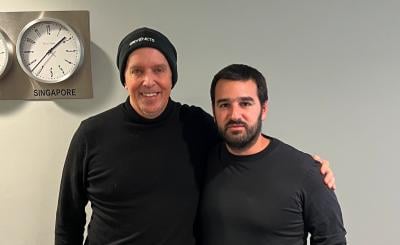Almost a quarter of a century ago I was sitting in my office overlooking Manhattan’s 6th Avenue interviewing a long-since forgotten analyst on the phone about the future of communications. (The phone didn’t actually have a rotary dial but, still, this was way back when.)
Terabit routers had just become “an important thing,” and I asked the analyst what, in theory, might come after terabit routing.
He struggled for the term.
“Well, I guess it would be petabit routing,” he said.
My, how we laughed. The idea of someone building a router a thousand times faster than terabit? Absurd! Never gonna happen.
Fast-forward to 2023
Fast-forward to Tuesday, Jan. 10, 2023. The office is now on 3rd Avenue, and Ido Susan, CEO of DriveNets, is quietly telling me that the next iteration of his DriveNets Network Cloud cloud-native software that turns the physical network into a shared resource supporting multiple network services will have an aggregate throughput of between 1.8 Pbps to 3.6 Pbps, depending on hardware — the last version, released in 2021, offered 800 Tbps.

DriveNets isn’t the first company to deliver petabit routing. Companies like Cisco, Huawei and Nokia all have products. But what sets DriveNets apart is that it doesn’t use specialized silicon to bring the heat. Instead, the company sells software that runs on clusters of off-the-shelf white box hardware, a.k.a. pizza boxes. (Arrcus is another startup company that uses this approach).
By disaggregating the hardware from the software, DriveNets delivers important benefits for telcos – including flexibility, scalability, redundancy and lower cost. But it turns out that this is not the only thing DriveNets is disaggregating. The next iteration of DriveNets Network Orchestrator (DNOR) (release 18, due out on Feb. 23, 2023) pulls off the same trick with services, and the network sitting underneath them, allowing customers to request and allocate resources virtually in near real-time.
You might think that this sort of flexibility is de rigeur on 21st-century telecom networks. But you’d be wrong. In reality, many telco networks are still provisioned by hoomans tippy tapping away at command line interfaces (CLI), or using patch cables or, worse, truck rolls (the horror).
But DriveNets is doing away with all that, turning the old, rigid ISO seven-layer networking stack into an opaque, fluid virtual pool of resources that can be added to or taken away or moved around or whatnot at the click of a mouse.
By disaggregating the router code from the router hardware, and the router hardware from the network itself, DriveNets resolves many of the network performance and provisioning challenges faced by network architects today.
You might even say that it “disaggravates” them (Ed. note: let’s not, please).
In August of 2022 DriveNets snagged $262 million in a Series C round led by round by D2 Investments with the participation from the vendor’s current investors, including Bessemer Venture Partners, Pitango, D1 Capital, Atreides Management and Harel Insurance Investments & Financial Services.
DriveNet's quarter of a billion dollar Series C is the kind of money that used to be an exit target for startup.
“You don’t get that level of funding unless you have some serious commercial traction,” says Andrew Lerner, Vice President at Gartner Research.
AT&T, the largest telecommunications company in the world, is DriveNet’s biggest customer to date. Ido told Silverlinings he has two more telcos lined up specifically for the new DNOR capabilities.
DriveNets’ humble beginnings
So, who is the person behind the success of DriveNets?
Ido and his brother, Lior, have a cool Jimmy Carter-style backstory, starting out as humble farmers before going on to do great things – first, by selling their company Intucell to Cisco for $475 million and then, in Ido’s case, with DriveNets.
Of the two, Ido has a reputation as the calm one. Brother Lior now runs an Israeli investment fund called Eclipse.
What is Ido’s long-term ambition for DriveNets? “I had an early success selling a business to Cisco. Now I’m ready to grow and run a $10 billion dollar business,” he said.
I wouldn’t put it past him.
Have a story to share with us? Write to the editors here.